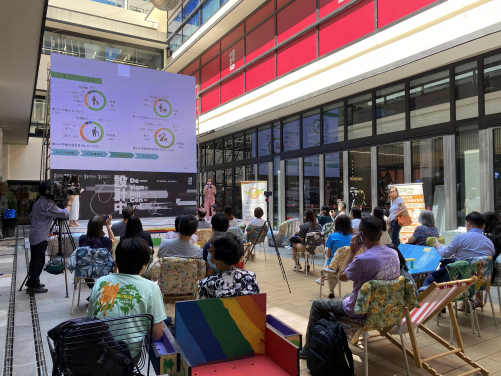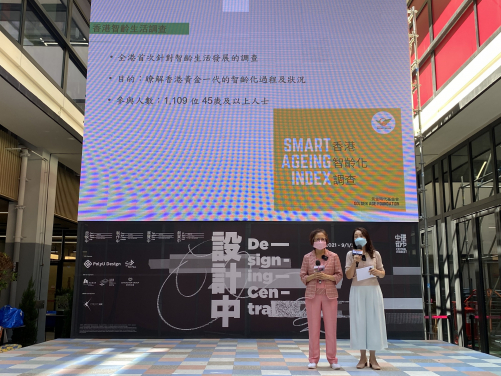Hong Kong Smart Ageing Survey
The Sandwich Generation Needs Support
12 Oct 2021
Population ageing has become a global issue. Hong Kong is also facing the same challenge. According to statistics from the Office of the Government Economist, Hong Kong SAR Government, there were 1.27 million elderly people (aged 65 and over) living in Hong Kong in 2018, accounting for 17.9% of the total population. It is expected that the elderly population will grow to 2.62 million (34.5%) by 2048, which means one out of every three people will be an elderly population by then1.
The “Hong Kong Smart Ageing Survey 2021”* was conducted by Golden Age Foundation and Department of Social Work and Social Administration, The University of Hong Kong. It aimed to understand the current situation and facilitate forward-looking discussions about the development of a smart-ageing city so that relevant institutions, local communities and the younger generations could have a basic understanding of the impact of population ageing and make appropriate preparations in advance.
A total of 1,100 Golden Agers (aged 45 and above) were interviewed with an online questionnaire on five dimensions of smart ageing: financial knowledge and management, health and healthcare, productivity and civic engagement, technology use and application, as well as social participation and care2.
Mrs Rebecca Choy Yung, Founder and Chair of Golden Age Foundation, stated that “The survey report covers multiple areas, including financial planning, health and medical care, technology, and social engagement which the Golden Age generation needs to pay attention to. According to the data from the Census and Statistics Department in mid-2021, the population aged 45-65 has reached 2.34 million, accounting for 31.6% of the total population. This group of people has become the so-called "Sandwich Generation". They have to look after not only the older and younger generations in their families, and very soon will have to face major issues themselves, such as getting older, retirement planning and elderly care arrangements. They need support in terms of financial planning, physical and mental health. The business community should also understand the economic development driven by the new needs of Golden Agers, and develop products and services that better meet their needs and wants. It is hoped that through the "Hong Kong Smart Ageing Survey 2021", the public will pay more attention to the needs of the Golden Age generation, and relevant products and services will be developed and promoted to meet the needs.
Professor Cecilia Chan and Assistant Professor Yu-Chih Chen (Principal Investigator) from the Department of Social Work and Social Administration, The University of Hong Kong, pointed out that the following directions are worthy for further exploration:
- In financial knowledge and management, approximately 70% rated being either neutral or dissatisfied with their current savings, future finance, ability to cope with financial crises, and their own financial management ability. Around 40% believed that their savings may not meet their financial needs in healthcare and long-term care.
- In productivity and civic engagement, over half of respondents reported they were willing to continue working after retired. In addition to economic reasons, making contributions to the society and feeling young were the drivers of the decision to keep working.
- In social participation and care, almost all of the respondents affirmed the importance of community care services. Of which, near half of them indicated that they would opt for ageing-in-place. It reflecting the huge demand on future elderly care services, from daily life care to medical care, from mental health to emotional support.
Based on the survey results and analysis of the current situation, the research team suggest the following measures as future response:
- 70% interviewees expressed concern about their future retirement
Services to improve the financial capability of the Golden Age Generation should be provided, supporting sound financial decisions and retirement planning, so that better later-life financial health can be achieved. Examples of such services include financial education, financial coaching for setting financial goals, and tailoring financial products to different stages of life, could increase the financial knowledge, skills, and the future economic well-being of the golden aged generation. In addition, inclusive efforts should be made to make these services available and accessible to the golden aged generation across different socioeconomic backgrounds.
- Willing to continue working after retired
Among respondents above the age of 45, about 50% had a job or were willing to look for another job. The top three reasons cited for their decision to continue working were economic reasons, the desire to make contributions, and to feel young. Things the Golden Age Generation are looking forward to in retirement not only include leisure activities (cited by 70% of respondents), but also being able to participate in various activities that contribute to society (cited by 50% to 70% of respondents), such as volunteering, continued work or education, and engaging in lifelong learning, with 80% of them wanting to share their experiences and expertise with others.
Golden Age Foundation advocates for a paradigm shift to empower golden agers to become society’s new driving force. In order to address the challenges of an ageing society, the government and other sectors should monitor employment trends of midlife and older adults to inform the development of policies, such as improving the employability of older workers, establishing age-friendly working environments, reducing barriers to employment (e.g., regular anti-discrimination monitoring and protection of employment opportunities). In terms of opportunities for social service and volunteering, activities can be tailored to the expertise and interests of the Golden Age Generation, with an emphasis on social interactions, self-growth, and knowledge-based activities. The aim of such an approach is to attract and encourage the participation of the Golden Age Generation in public and social affairs and promote productive ageing.
- Improve the planning of care and end-of-life arrangements in old ages
The attitudes of the Golden Age Generation towards the care and death arrangements warrants our attention. Survey findings show that 98% of the respondents agreed that the community should provide care services for older adults. In terms of preferences for elderly care arrangements, most respondents indicated that they would opt for ageing-in-place (nearly 50%) or serviced apartments for the elderly (about 10%); however, about 30% of respondents had not yet considered plans for care arrangements. More than half of the respondents had not had discussions about after-death arrangements, wills, or advance directives with their families.
Following the trend of ageing-in-place, many healthy midlife and older adults have opted to use home and community care services which is reflected in our survey findings. Studies have also shown that providing older adults with home care services while they are still healthy can reduce future expenses in nursing homes or medical expenses that may be incurred in long-term care. Therefore, it is recommended that service providers should increase the ratio of home and community care services, such as ageing-in-place schemes or serviced housing, to meet the future care needs of the Golden Age Generation. In addition, it is also important to understand the thoughts of those who do not choose any care service arrangement. The Government and professionals of the care industry should promote appropriate elderly care services and end-of-life arrangements through various channels.
To view or download the Hong Kong Smart Ageing Survey 2021 Full Report:
https://www.goldenage.foundation/en/content/smart-ageing-index
Download Event Photos:
https://drive.google.com/drive/folders/1AzEBWOwMgzmH0L1TKXK_LodiclyMLG0q?usp=sharing
For enquiries, please contact:
Ms Milla Wong
Tel: (852) 6229 1907
Email: [email protected]
* “Hong Kong Smart Ageing Survey 2021” was contacted from November to December 2020, sponsored by AXA.
1Wong, K., & Yeung, M. (2019). Population ageing trends of Hong Kong. Hong Kong: Office of the Government Economist, The Government of the Hong Kong Special Administrative Region.
2Baraković Husić, J., Baraković, S., & Cero Dinarević, E. (2019). Smart Ageing: Are We Succeeding? In A. Badnjevic, R. Škrbić & L. Gurbeta Pokvić (Eds.), CMBEBIH 2019. IFMBE Proceedings, vol 73: Springer.
About Golden Age Foundation
Founded in 2015, the Golden Age Foundation (GAF) is a non-profit organisation (Charity No.: 91/14446) formed by a group of social entrepreneurs and professionals, with missions to empower the Golden Age Population (aged 45+) to lead purposeful, healthy and quality lives; develop the Golden Age economy; build a cross-sector and cross-generational platform for collaboration and innovation.
GAF takes the lead in social innovation and tackles population ageing issues through training programmes, including the Golden Age Fellows programme, the Golden Age Docent programme, the Golden Age – Climate Change & Conservation Ambassador Programme, School Dialogues and the Pledge of Love from Generation to Generation programme. The programmes are specially designed to foster cross-generational harmony and allow Golden Agers to give back to society by discovering new passions and talents.
GAF regularly organises various activities to connect friends from the civil, business, government, academic and research sectors to joint efforts in building a cross-sector innovation platform, with the goal of developing Hong Kong into a smart ageing city.



